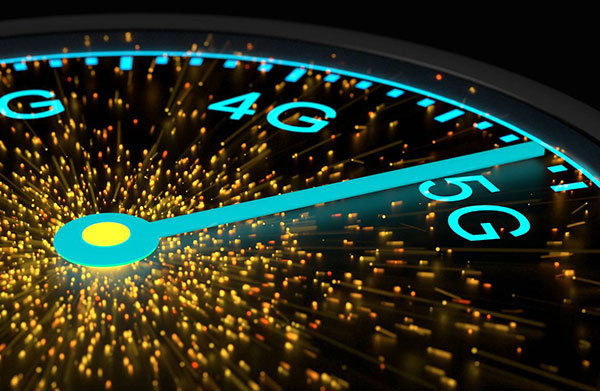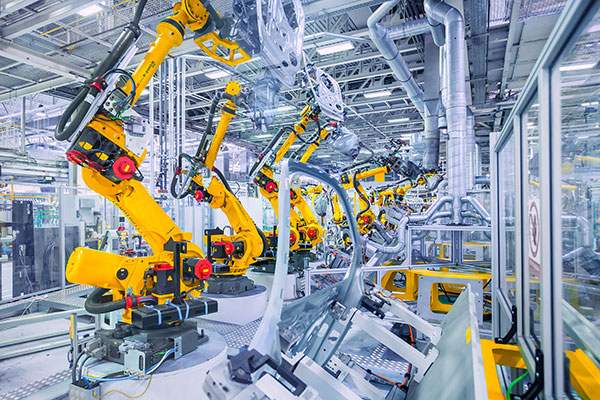News Center

On June 6, the Ministry of Industry and Information Technology issued 5G commercial licenses, indicating that China officially entered the first year of 5G commercial use.
Because 5G has the characteristics of high speed, low delay, cloud intelligence, mass connection, etc., it can provide the network foundation for the industrial Internet, and then 5G is regarded as the "accelerant" of the industrial Internet, and industrial robots are one of the important parts of the industrial Internet, so there is a view that with the commercial use of 5G technology, it will inevitably have an impact on industrial robots.

For the characteristics of 5G, some industry insiders analyze that the arrival of 5G will help industrial robots upgrade:
First, in terms of security, it is believed that when 5G technology is connected to industrial robots, the working status of industrial robots will be monitored in real time, and in the event of an emergency, the operation can be quickly stopped remotely, thus effectively preventing industrial robots from hurting people.
Second, in the cloud, in the intelligent manufacturing production scenario, it is necessary for robots to have self-organization and collaborative capabilities to meet flexible production, which brings the demand for robots to cloud. In order for robots to achieve cloud, the wireless communication network must have the characteristics of extremely low delay and high reliability, and 5G technology just has these characteristics.
Third, in terms of flexibility, it is believed that the high-speed 5G network will make the robot receive information and task instructions more efficient and fast in the application process, and 5G can connect tens of thousands or hundreds of millions of devices, providing the possibility for the transmission of huge amounts of data, which has a certain role in promoting the development of artificial intelligence robots.
But imagination is always good, everything has to return to reality, in the face of the overwhelming "5G will make industrial robots change" view, more need to be calm.
In this regard, Zhang Xinghua, general manager of Guangdong Tiantai Robot, believes that 5G solves the transmission problem, and the impact on industrial robots themselves is not so great. However, 5G will have a great impact on the industrial Internet, and robots, as a very important terminal of industrial interconnection, will make more industrial robot industries access 5G functions.

Although the impact of 5G on industrial robots is not yet clear, it is always good to layout in advance, and some enterprises have already entered before 5G is popularized.
In February, Qualcomm launched its first complete, integrated solution for robots, the Qualcomm Robot RB3 platform, and said that the RB3 platform will support 5G connectivity later this year to meet the needs of industrial robot applications for low latency and high throughput.
1、In February, Denso Robot's automation factory conducted empirical experiments on industrial robots equipped with 5G communication systems.
At the MWC2019 conference on February 25-28, 2019, ZTE and Siasun demonstrated the "5G+AR+ collaborative robot" jointly built.
From the perspective of the layout of all parties, all parties are impatient before 5G is popularized, and they all want to get a share of the pie in advance. Will 5G be an opportunity for the industrial robot industry?
The answer is inevitable, according to Zuo Yunguang, vice president of Tuostar, said, "We are now striving to catch up with the industrial Internet this car, the Internet of everything ah, 5G will definitely change a lot, we do not want to be abandoned."
According to Zhang Xinghua, general manager of Tiantai Robotics, "5G will inevitably bring changes to many industries, and even change the shape of many products, which will bring a large wave of business opportunities, making the application industry of robots change, and robots will also be affected."
Intuitively speaking, with the issuance of 5G commercial licenses, global operators are actively deploying 5G networks, and with huge investment, system equipment, such as 5G base stations, optical modules, radio frequencies, chips, mobile phone terminals and other technical products will be rapidly commercialized. The industrial chain, including Huawei, ZTE, mobile, telecom, Unicom and various mobile phone manufacturers, will usher in a wave of rapid development stage, which will bring huge opportunities to communication equipment manufacturers.
At present, Huawei has won 42 5G commercial contracts around the world, and 5G base stations have shipped more than 100,000. Zte has 5G cooperation with more than 40 operators around the world.
As Sun Shangchuan, chairman of Shenzhen Dafu Technology, said in an interview with the media that in the 5G era, the demand for base station filters has doubled, which will be an opportunity for Dafu Technology and domestic intelligent manufacturing equipment manufacturers.
It can be seen that the popularity of 5G has a certain role in promoting the 3C industry, and in 3C manufacturers, manual work has high cost, low efficiency, high error rate, low product rate, and "machine replacement" is imminent, so with the popularity of 5G will indirectly bring a wave of market demand for industrial robots.
Although the commercial use of 5G will be a big opportunity for industrial robots, there are often opportunities and challenges.
5G, as the fifth generation mobile communication technology, will promote the upgrading of some parts of industrial robots when applied to industrial robots.
For example, with the commercial use of 5G, some manufacturers will gradually consider integrating 5G modules, which is difficult for manufacturers with weak research and development capabilities.
In addition, there are views that 5G technology will promote the development of cloud-based robots, so that industrial robots can be controlled from the cloud, and the control system will no longer need to rely on special hardware and software, only the general computer operating system and self-written programs can be, so it has a certain impact on enterprises with advantages in control systems.
All in all, the commercial use of 5G will be a big opportunity for the industrial robot industry, but after all, 5G is still in the initial stage. According to Zhang Xinghua, general manager of Tiantai Robotics, "the changes of 5G to industrial robots will be reflected in a long period of time, and there is no need to emphasize the impact of 5G on robots in the short term."
(Source: Control Engineering Network)
Return to Overview